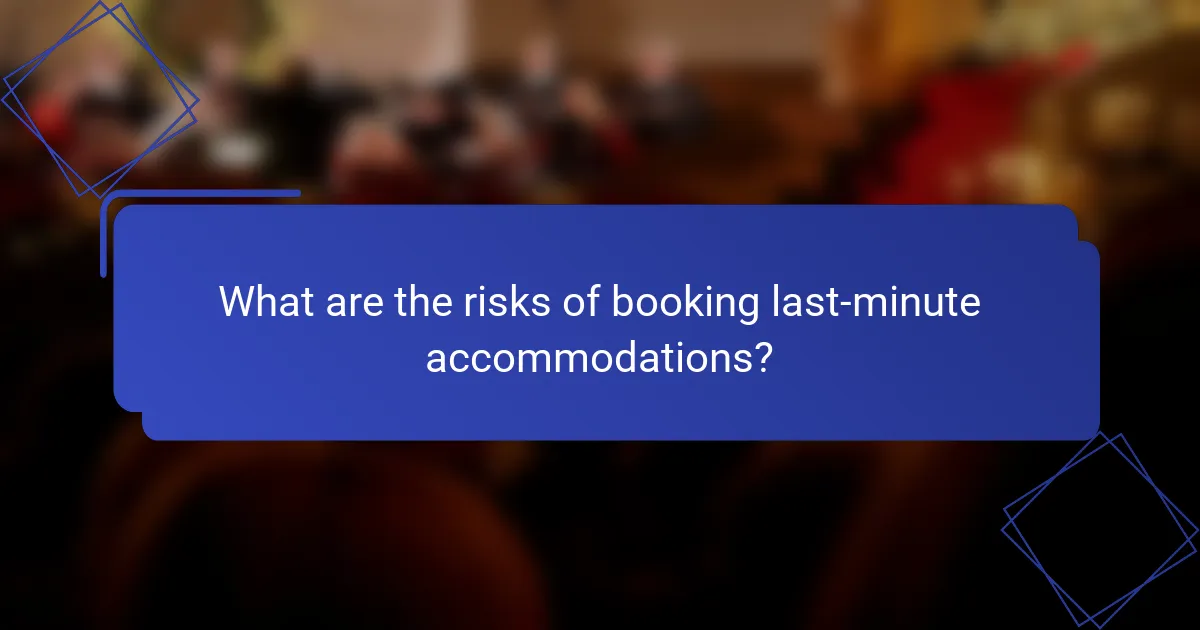Booking last-minute accommodations can be daunting, especially in bustling cities like New York. By leveraging mobile apps, exploring online deals, and maintaining flexibility with your travel plans, you can enhance your chances of finding a suitable place to stay. Additionally, being aware of major festivals and events can help you plan ahead and avoid the rush for available lodging.

How to find last-minute accommodations in New York City?
Finding last-minute accommodations in New York City can be challenging but manageable with the right strategies. Utilize mobile apps, check online platforms for deals, and contact hotels directly to secure a room quickly.
Use mobile apps like HotelTonight
Mobile apps such as HotelTonight specialize in offering discounted rates for last-minute bookings. These platforms often feature a range of hotels available for same-day or next-day stays, making it easy to find a place quickly.
When using these apps, be sure to compare prices and read reviews to ensure you’re getting a good deal. Many users find savings of 20-60% off regular rates, especially for less popular hotels.
Check last-minute deals on Booking.com
Booking.com frequently lists last-minute deals that can help you secure accommodations in New York City. The site allows you to filter search results by “last-minute” options, showcasing properties that are eager to fill vacancies.
Look for properties that offer free cancellation, which provides flexibility if your plans change. Discounts can range from modest to significant, depending on the hotel’s occupancy levels.
Contact local hotels directly
Reaching out to hotels directly can yield unexpected last-minute deals. Many hotels prefer to fill their rooms rather than leave them empty and may offer lower rates if you call them directly.
When contacting hotels, ask about any unadvertised specials or discounts for same-day bookings. It’s also beneficial to inquire about amenities and services that might not be listed online, ensuring you get the best value for your stay.

What are effective booking strategies for last-minute stays?
Effective booking strategies for last-minute stays include being flexible with travel dates, exploring alternative neighborhoods, and setting price alerts on travel websites. These approaches can significantly enhance your chances of securing affordable accommodations.
Be flexible with your travel dates
Flexibility with travel dates can lead to better deals on last-minute accommodations. Prices often vary depending on the day of the week, with midweek stays typically being cheaper than weekends. If you can adjust your plans by a day or two, you may find significant savings.
Consider traveling during off-peak seasons or avoiding major holidays when demand is high. For example, booking a stay in early September instead of late August can yield lower rates and more availability.
Consider alternative neighborhoods
Exploring alternative neighborhoods can uncover hidden gems and more affordable lodging options. Popular tourist areas often come with a premium price tag, while nearby districts may offer similar amenities at a fraction of the cost.
For instance, if you’re visiting a major city, look for accommodations in less touristy neighborhoods that are well-connected by public transport. This strategy not only saves money but also provides a chance to experience local culture.
Set price alerts on travel websites
Setting price alerts on travel websites can help you snag the best deals for last-minute stays. Many platforms allow you to specify your destination and desired price range, notifying you when suitable options become available.
Utilize popular travel sites like Booking.com or Kayak, which offer user-friendly alert systems. This way, you can act quickly when prices drop, ensuring you don’t miss out on a great deal.

Which popular festivals affect accommodation availability?
Major festivals significantly impact accommodation availability, often leading to increased demand and higher prices. Travelers should be aware of these events to secure lodging in advance and avoid last-minute hassles.
New York City Marathon
The New York City Marathon, held annually in early November, attracts thousands of runners and spectators, causing a surge in hotel bookings. Accommodations near the race route, particularly in Manhattan, can fill up quickly, often months in advance.
To secure a room, consider booking at least three to six months ahead of the event. Look for hotels that offer flexible cancellation policies in case your plans change.
Tribeca Film Festival
The Tribeca Film Festival, typically taking place in April, draws film enthusiasts and celebrities, leading to high demand for nearby accommodations. Hotels in lower Manhattan experience significant price hikes during this time.
Plan to book early, ideally four to five months in advance, and explore alternative lodging options like short-term rentals or hostels to find more affordable rates.
SummerStage Concert Series
SummerStage, a series of outdoor concerts in Central Park, runs from June to August and attracts large crowds. This influx can lead to increased accommodation demand, especially on weekends when popular acts perform.
For the best rates, aim to book your stay at least two to three months prior to the concert dates. Consider staying slightly outside of Manhattan, where prices may be lower, and public transport can easily connect you to the venue.

What factors influence last-minute accommodation prices?
Last-minute accommodation prices are primarily influenced by seasonal demand, proximity to major events, and booking platform fees. Understanding these factors can help travelers make informed decisions and potentially save money.
Seasonal demand fluctuations
Accommodation prices often rise during peak travel seasons, such as summer and major holidays, due to increased demand. Conversely, prices may drop during off-peak times when fewer travelers are seeking lodging.
For example, booking a hotel in a ski resort during winter holidays will likely cost significantly more than in early spring. Travelers should consider timing their bookings to align with less popular travel periods for better rates.
Proximity to major events
Prices can spike dramatically when accommodations are near major events like festivals, concerts, or sports games. The closer the lodging is to the event venue, the higher the likelihood of inflated prices due to high demand.
For instance, hotels near a music festival may charge double or triple their usual rates during the event weekend. It’s wise to book well in advance if attending a popular event, or consider staying further away and using public transport to save on costs.
Booking platform fees
Different booking platforms may charge varying fees that can affect the final price of accommodations. Some sites add service fees or impose higher rates for last-minute bookings, which can significantly increase overall costs.
Travelers should compare prices across multiple platforms and check for hidden fees. Using direct hotel websites may sometimes yield better deals without additional charges, making it a good practice to explore all options before finalizing a booking.

How to assess the quality of last-minute accommodations?
To assess the quality of last-minute accommodations, focus on recent guest feedback, ratings, and the credibility of the listing platform. This approach helps ensure you choose a place that meets your expectations and avoids unpleasant surprises.
Read recent guest reviews on TripAdvisor
Recent guest reviews on TripAdvisor provide valuable insights into the quality of accommodations. Look for comments about cleanliness, service, and overall experience to gauge what to expect. Pay attention to the most recent reviews, as they reflect the current state of the property.
When reading reviews, consider the number of reviews and the overall rating. A property with hundreds of reviews and a high rating is generally more reliable than one with only a few reviews. Look for patterns in feedback to identify consistent strengths or weaknesses.
Check ratings on Google Maps
Google Maps ratings offer another layer of assessment for last-minute accommodations. Ratings are often accompanied by user-submitted photos and detailed reviews, which can help you visualize the space. Check the location on the map to ensure it meets your needs in terms of accessibility and nearby attractions.
Look for properties with a rating of at least 4 stars, as these typically indicate a satisfactory experience. Additionally, consider the number of ratings; a higher volume can suggest a more reliable assessment of the accommodation’s quality.
Look for verified listings on Airbnb
Verified listings on Airbnb are marked to indicate that the host has met certain quality standards. These listings often come with detailed descriptions, high-quality photos, and clear cancellation policies. Prioritize these verified options to enhance your chances of a positive stay.
Check for superhosts, as they are experienced hosts with a proven track record of excellent service. Reading the host’s response rate and average response time can also provide insights into their reliability and commitment to guest satisfaction.

What are the risks of booking last-minute accommodations?
Booking last-minute accommodations can lead to several risks, primarily limited choices and increased costs. Travelers may find that their preferred hotels or rentals are fully booked, forcing them to settle for less desirable options or pay a premium for availability.
Limited availability of preferred options
When booking last-minute, many popular accommodations may already be reserved, particularly during peak travel seasons or major events. This can result in a lack of options that meet your preferences for location, amenities, or price range.
For instance, if you’re looking for a beachfront hotel during a summer festival, you might only find availability in less desirable areas or at properties that don’t meet your standards. It’s advisable to check multiple platforms and be flexible with your travel dates to increase your chances of finding suitable options.
Higher prices compared to early bookings
Last-minute bookings often come with higher prices, as many accommodations increase rates as their availability decreases. This can mean paying significantly more than if you had booked weeks or months in advance.
For example, a hotel room that costs $150 per night when booked early might jump to $250 or more as the date approaches. To mitigate this, consider setting price alerts on travel websites or using last-minute booking apps that may offer discounts, but be prepared for potential compromises on quality or location.



